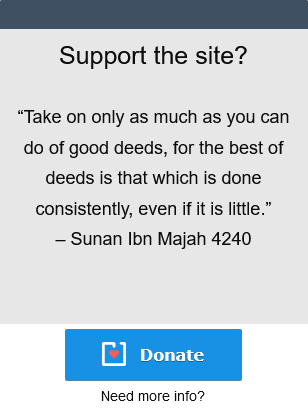Worship in Islam
The concept of worship in Islam differs from that found in other religions and is, therefore, subject to misunderstanding. In general, worship is understood to mean the observance of certain rituals: prayer, fasting, giving charity, and other 'good' works. In Islam, however, worship is much more; it is one's entire life. The definition goes something like this: "Worship is an all-inclusive term for those internal and external sayings and actions of a person that are pleasing to Allah." In other words, worship is that which is done in obedience to Allah's will, which obviously includes rituals but goes far beyond to the realms of one’s beliefs, social activities, and personal contributions to one's society and fellow human beings.
Islam looks at the individual as a whole. He is required to submit completely to Allah, as the Quran instructed Prophet Muhammad sallallaahu 'alayhi wasallam to do; Allah Says (what means): “Say: ‘Indeed, my prayer, my rites of sacrifice, my living and my dying are for Allah, Lord of the worlds. No partner has He. And this I have been commanded, and I am the first [among you] of the Muslims.’” [ Quran: 6:162-163]
The natural result of this submission is that one's activities should conform to the instructions of the One to whom the person is submitting - Allah. Islam requires that its followers conduct every aspect of their lives according to its teachings. This might sound strange to those who view religion as a personal relationship between the individual and his Lord and which should have no relevance to those activities that are not connected specifically with any religious rituals.
The Prophet Muhammad sallallaahu `alayhi wa sallam ( may Allah exalt his mention ) taught his followers that Islam is much more than a private personal matter. Islam attaches no value to rituals that are performed mechanically and have no influence on one's inner life. This issue was addressed in an incident when Muslims, as well as local Jews and Christians, disputed about the prayer direction being changed from Jerusalem to the Ka'bah (the Sacred Mosque) in Makkah: Allah Says (what means): “Righteousness is not that you turn your faces toward the east or the west, but [true] righteousness is [in] one who believes in Allah, the Last Day, the Angels, the Book, and the prophets and gives wealth, in spite of love for it, to relatives, orphans, the needy, the traveller, those who ask [for help], and for freeing slaves; [and who] establishes prayer and gives
Zakah; [those who] fulfil their promise when they promise; and [those who] are patient in poverty and hardship and during battle. Those are the ones who have been true, and it is those who are the righteous.” [ Quran: 2:177]
The deeds mentioned in the above verse are indications that a person is righteous.
Honest work is considered a type of worship. The Prophet sallallaahu `alayhi wa sallam ( may Allah exalt his mention ) said: "Whoever finds himself at nightfall tired of his work, Allah will forgive his sins." Seeking knowledge is one of the highest forms of worship. The Prophet sallallaahu `alayhi wa sallam ( may Allah exalt his mention ) told his companions that "Seeking knowledge is a (religious) duty on every Muslim." Social courtesy and cooperation, when done for the sake of Allah, are also a part of worship: "Receiving your friend with a smile is a type of charity, helping a person to load his animal is a charity, and putting some water in your neighbour's bucket is a charity."
In Islam, the performing of one's duties is also considered an act of worship. The Prophet sallallaahu `alayhi wa sallam ( may Allah exalt his mention ) told us that whatever one spends on his family will be counted as an act of worship for which he will be rewarded, provided what he spent was acquired by Islamically acceptable means. Kindness to family members, no matter how small, is also viewed as an act of worship. Even activities that we enjoy very much, such as sexual relations with one's spouse, are considered acts of worship as long as they are performed in accordance with the relevant Quranic and prophetic guidelines.
For example, the Prophet sallallaahu `alayhi wa sallam ( may Allah exalt his mention ) once told his Companions that they would be rewarded even for engaging in sexual intercourse with their wives. They were astonished and asked: "Are we to be rewarded for doing something that we enjoy very much?" The Prophet sallallaahu `alayhi wa sallam ( may Allah exalt his mention ) replied: "If you satisfy your desires illegally, will you be punished?" They replied: "Yes." So the Prophet sallallaahu `alayhi wa sallam ( may Allah exalt his mention ) said: "So for satisfying it legally with your wives, you will be rewarded."
The concept of worship in Islam differs from that found in other religions and is, therefore, subject to misunderstanding. In general, worship is understood to mean the observance of certain rituals: prayer, fasting, giving charity, and other 'good' works. In Islam, however, worship is much more; it is one's entire life. The definition goes something like this: "Worship is an all-inclusive term for those internal and external sayings and actions of a person that are pleasing to Allah." In other words, worship is that which is done in obedience to Allah's will, which obviously includes rituals but goes far beyond to the realms of one’s beliefs, social activities, and personal contributions to one's society and fellow human beings.
Islam looks at the individual as a whole. He is required to submit completely to Allah, as the Quran instructed Prophet Muhammad sallallaahu 'alayhi wasallam to do; Allah Says (what means): “Say: ‘Indeed, my prayer, my rites of sacrifice, my living and my dying are for Allah, Lord of the worlds. No partner has He. And this I have been commanded, and I am the first [among you] of the Muslims.’” [ Quran: 6:162-163]
The natural result of this submission is that one's activities should conform to the instructions of the One to whom the person is submitting - Allah. Islam requires that its followers conduct every aspect of their lives according to its teachings. This might sound strange to those who view religion as a personal relationship between the individual and his Lord and which should have no relevance to those activities that are not connected specifically with any religious rituals.
The Prophet Muhammad sallallaahu `alayhi wa sallam ( may Allah exalt his mention ) taught his followers that Islam is much more than a private personal matter. Islam attaches no value to rituals that are performed mechanically and have no influence on one's inner life. This issue was addressed in an incident when Muslims, as well as local Jews and Christians, disputed about the prayer direction being changed from Jerusalem to the Ka'bah (the Sacred Mosque) in Makkah: Allah Says (what means): “Righteousness is not that you turn your faces toward the east or the west, but [true] righteousness is [in] one who believes in Allah, the Last Day, the Angels, the Book, and the prophets and gives wealth, in spite of love for it, to relatives, orphans, the needy, the traveller, those who ask [for help], and for freeing slaves; [and who] establishes prayer and gives
Zakah; [those who] fulfil their promise when they promise; and [those who] are patient in poverty and hardship and during battle. Those are the ones who have been true, and it is those who are the righteous.” [ Quran: 2:177]
The deeds mentioned in the above verse are indications that a person is righteous.
Honest work is considered a type of worship. The Prophet sallallaahu `alayhi wa sallam ( may Allah exalt his mention ) said: "Whoever finds himself at nightfall tired of his work, Allah will forgive his sins." Seeking knowledge is one of the highest forms of worship. The Prophet sallallaahu `alayhi wa sallam ( may Allah exalt his mention ) told his companions that "Seeking knowledge is a (religious) duty on every Muslim." Social courtesy and cooperation, when done for the sake of Allah, are also a part of worship: "Receiving your friend with a smile is a type of charity, helping a person to load his animal is a charity, and putting some water in your neighbour's bucket is a charity."
In Islam, the performing of one's duties is also considered an act of worship. The Prophet sallallaahu `alayhi wa sallam ( may Allah exalt his mention ) told us that whatever one spends on his family will be counted as an act of worship for which he will be rewarded, provided what he spent was acquired by Islamically acceptable means. Kindness to family members, no matter how small, is also viewed as an act of worship. Even activities that we enjoy very much, such as sexual relations with one's spouse, are considered acts of worship as long as they are performed in accordance with the relevant Quranic and prophetic guidelines.
For example, the Prophet sallallaahu `alayhi wa sallam ( may Allah exalt his mention ) once told his Companions that they would be rewarded even for engaging in sexual intercourse with their wives. They were astonished and asked: "Are we to be rewarded for doing something that we enjoy very much?" The Prophet sallallaahu `alayhi wa sallam ( may Allah exalt his mention ) replied: "If you satisfy your desires illegally, will you be punished?" They replied: "Yes." So the Prophet sallallaahu `alayhi wa sallam ( may Allah exalt his mention ) said: "So for satisfying it legally with your wives, you will be rewarded."




